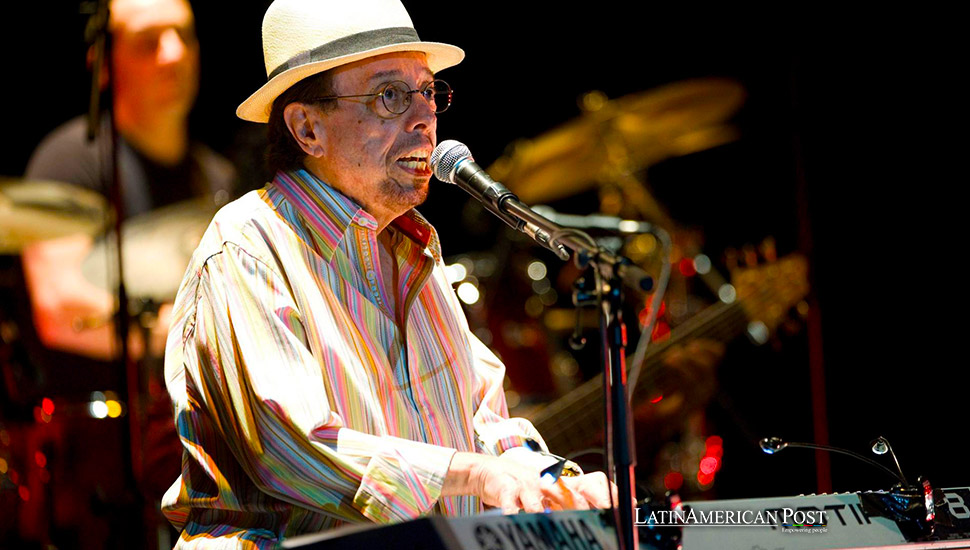The Legacy of Sérgio Mendes: Brazil’s Iconic Musical Ambassador

Sérgio Mendes, the legendary Brazilian pianist, composer, and arranger, passed away at 83, leaving behind an enduring legacy. His innovative bossa nova and jazz blend captivated U.S. audiences and forever transformed the global music scene.
Sérgio Mendes, the Brazilian pianist, composer, and arranger, passed away in Los Angeles at 83, leaving an indelible mark on the music world. Mendes was more than just an artist—he was a bridge between Brazil’s vibrant rhythms and the United States’ contemporary sounds. Born in 1941 in Niterói, a coastal city neighboring Rio de Janeiro, Mendes trained as a classical pianist before turning to more modern musical genres. He fused bossa nova, a uniquely Brazilian style, with jazz and pop influences, propelling him to stardom and cementing his status as Brazil’s musical ambassador to the world.
Mendes’ journey took a significant turn when political unrest in Brazil forced him into exile. After the military coup 1964, Mendes left his home country and settled in the United States, a decision that marked a pivotal point in his career. His relocation to California allowed him to refine his sound, blending Brazilian rhythms with the jazz influences prevalent in the U.S. This fusion resulted in a style that was authentic and fresh, captivating audiences on both sides of the Americas.
Throughout the 1960s, Mendes became one of the leading figures in the modernization of bossa nova. His innovative piano arrangements created new harmonic structures for the genre, giving it a broader appeal. Mendes’ approach to music earned him worldwide recognition, and by the end of the decade, he had firmly established himself as a global icon.
Mas Que Nada: A Timeless Anthem with Global Appeal
While Sérgio Mendes’ vast body of work, one particular song stands out—his bossa nova rendition of Mas Que Nada. Initially written by Jorge Ben Jor, Mendes’ version of the song became a global sensation and is now considered one of the most recognizable pieces of Brazilian music worldwide. Mas Que Nada was a hit and a cultural phenomenon, helping to popularize bossa nova in the United States.
The success of Mas Que Nada was emblematic of Mendes’ ability to take traditional Brazilian sounds and make them accessible to international audiences. Mendes’ version, characterized by its smooth bossa nova rhythms combined with a light jazz influence, resonated with listeners worldwide and became an instant classic.
In 2006, Mendes breathed new life into the song with a collaboration that stunned the music world. Working with the famous American group Black Eyed Peas, Mendes released a modernized dance-floor version of Mas Que Nada that introduced the iconic track to a new generation. The collaboration became a global hit and further solidified Mendes’ ability to remain relevant across decades of evolving musical landscapes.
This remix of Mas Que Nada proved that Mendes’ music was timeless and showed that his influence extended far beyond his original fan base. The collaboration bridged cultures and genres, a testament to Mendes’ enduring artistic vision.
Bridging Brazil and the U.S.
Sérgio Mendes’ move to the United States in the 1960s allowed him to play a crucial role in shaping the global perception of Brazilian music. At a time when political unrest dominated headlines, Mendes used his music to share the beauty and complexity of Brazilian culture with the world. His concerts and albums introduced a wide range of Brazilian artists to international audiences, including legends such as Tom Jobim, Gilberto Gil, and Dori Caymmi.
Mendes was invited to perform for two U.S. presidents—Lyndon B. Johnson and Richard Nixon—at the White House, clearly reflecting his importance as a cultural ambassador. His music transcended political boundaries, offering a glimpse into Brazil’s rich musical heritage while appealing to the modern sensibilities of American audiences.
Mendes’ legacy in the U.S. also included his prolific recording career. Over six decades, he released over 35 albums, many of which went gold or platinum. His music was a staple in jazz and pop charts throughout the 1960s and 70s, and he earned numerous awards for his contributions to the music industry, including three Grammy Awards and an additional six nominations.
In 2012, Mendes was inducted into the Latin Songwriters Hall of Fame, a testament to his impact on Latin music and the broader global music scene. Mendes brought Brazilian music to the world stage and enriched it with new influences, creating a sound rooted in tradition and daringly modern.
A Collaborative Spirit
Throughout his career, Sérgio Mendes displayed an unmatched ability to stay relevant by collaborating with artists across generations. His collaborations were not limited to Brazilian musicians but extended to some of the biggest names in international music. Mendes worked with pop stars like Justin Timberlake, John Legend, and Erykah Badu, infusing his signature Brazilian rhythms into mainstream music. These partnerships allowed Mendes to reach younger audiences and stay connected to the changing music industry trends.
One of the most significant collaborations of Mendes’ later career was his work with Carlinhos Brown, a Brazilian percussionist and singer. Together, they brought Brazilian rhythms to the forefront of the global music scene, blending classic samba and bossa nova with more contemporary sounds. Mendes’ collaborations consistently reflected his forward-thinking approach to music, always seeking to evolve and experiment without losing sight of his Brazilian roots.
Mendes’ influence extended to film as well. He was nominated for an Oscar for his work on the animated movie Rio, demonstrating his music’s versatility and broad appeal. His compositions for Rio introduced the rhythms of Brazil to a new generation of moviegoers, many of whom were experiencing Brazilian music for the first time.
As a collaborative artist, Mendes showed that music has the power to connect people across cultures and generations. His partnerships with global artists continued to push the boundaries of what Brazilian music could achieve on the world stage, ensuring that his legacy would live on in the work of others.
Sérgio Mendes’ Enduring Legacy
Sérgio Mendes was more than just a Brazilian musician—he was a global phenomenon who used his talents to introduce the world to the beauty and complexity of Brazil’s musical heritage. From his groundbreaking work in bossa nova to his collaborations with contemporary pop stars, Mendes’ influence is undeniable. His ability to blend Brazilian rhythms with jazz, pop, and electronic music allowed him to transcend borders and appeal to listeners worldwide.
Mendes’ enduring legacy includes innovation, collaboration, and cultural exchange. He opened the door for future generations of Brazilian artists, proving their music could find a home on the world stage. As the world mourns his passing, his music continues to inspire, bringing joy to listeners and reminding us of the transformative power of art.
Also read: Gustavo Cerati: A Decade Without Latin America’s Rock Icon
Mendes’ life and career were defined by his passion for creating music that spoke to the soul, and his work will undoubtedly continue to shape the global music landscape for decades to come. Sérgio Mendes leaves a legacy of timeless music, a reminder that, even in a constantly changing world, the universal language of music can unite us all.




